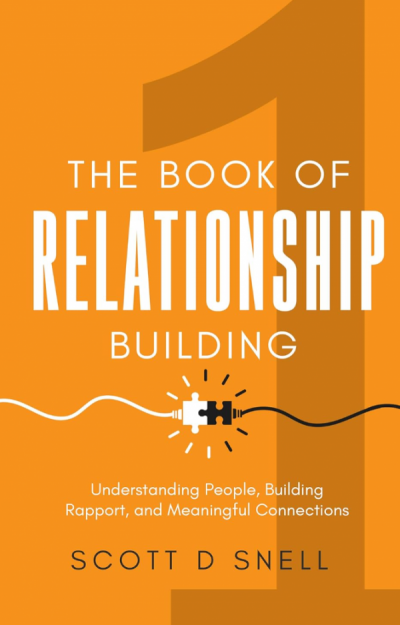
Description
Guest blog by Scott Snell - Being a good listener; Why listening matters
For this week’s blog, we share an exert from Scott Snell’s new book: The Book of Relationship Building: Understanding People, Building Rapport, and Meaningful Connections. Scott has a remarkable 25-year career collaborating with top-tier individuals and businesses globally. His successes are rooted in the art of nurturing talent, fostering inclusive cultures, and establishing meaningful connections. A true maestro in people development, whether through coaching, mentoring, training delivery, or cultivating a dynamic learning environment, Scott has consistently demonstrated a first-class commitment. But it is an approach to developing winning cultures that is impressive. Having worked in major corporates such as PepsiCo and Mondelez, and across European markets and cultures, Scott always finds a way to win the hearts and minds of the people in the organisation, delivering teams focused on a collective outcome and a passion to deliver it. The key to his success? Building authentic relationships. Scott firmly believes that the essence of triumph in any organisation lies in genuine human connections. Beyond the confines of spreadsheets, he understands that business success is defined, crafted, owned, and delivered by people. In order to build strong relationships, you need to be a good listener. Here is an exert from Scott’s book that focuses listening and why it matters: BEING A GOOD LISTENER; WHY IT MATTERS We human beings have certain needs. Some of those needs, like sustenance and water, are obvious. Others are less so; but while they may be more subtle, they're no less important. The need to be heard is one such need. As human beings, we have a deep-seated need to be heard because being heard makes us feel validated (The Importance of Being Heard, 2022). When you feel validated, you feel that you matter to the person before you. You feel respected by them. Feeling that you are heard, then, makes you feel that your thoughts and feelings are important, have meaning, and are accepted. By extension, feeling that you're validated makes you feel that you truly belong somewhere. Given all that, making someone feel heard by really listening to them can be a transformative experience for your relationship with them. It can increase the trust they place in you; how open, honest, and transparent they are with you; and how close the two of you are. In other words, genuinely listening to someone is something that can foster your connections with them and make them stronger. At the same time, it can allow you to understand the person before you better. When you truly listen to someone, you get to grasp their perspective, which may be different from your own experiences and emotions. You get to grasp why they act and think the way they do and where they're coming from when they do so, which strengthens your bonds with them even more (Michelitsch, 2023). Good listening skills aren't only great for your personal relationships, though. They're very helpful for your business relationships and professional settings, too. For instance, good listening skills can make sure that you fully and thoroughly understand a task your manager is giving or a colleague is relaying to you at work. It can ensure you don't miss or forget any vital information or misunderstand anything that's presented to you. This will enable you to do your job and finish your task to the best of your abilities, allowing you to shine at work. On top of that, proper listening can help resolve conflicts sooner, too, regardless of whether they're personal or professional. A number of the conflicts we have in life stem from misunderstandings, as you may know. Since listening well can reduce the number of misunderstandings that may occur in a conversation, it can also reduce the number of conflicts you get into. Aside from that, your listening skills can help you understand why someone was offended or upset by a certain action or behaviour. You can thus come to understand the reason behind a particular argument or fight more quickly and address it. You can apologise for any mistakes you made or clarify a misunderstanding that upset someone. In short, you can get to the root causes of conflicts quickly, thanks to your listening skills, and solve those conflicts before they worsen and spoil everyone's day. An added benefit is that understanding the root causes of various conflicts can help you avoid them in the future. If you know what kind of behaviour is upsetting for someone, for instance, you can avoid it in the future and keep from having an unnecessary argument. This is only possible if you know how to listen, though, since otherwise, you'll let your assumptions, which may be biased, dictate your actions and lead you in the wrong direction, making it impossible for you to avoid similar problems in the future. How can you avoid or solve a problem if you don't know its true cause? If you want to read more from Scott’s book, The Book of Relationship Building: Understanding People, Building Rapport, and Meaningful Connections, you can buy it now at AmazonInfo
-->





